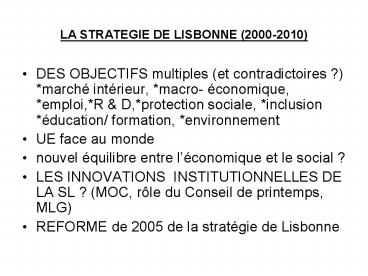LA STRATEGIE DE LISBONNE 20002010 - PowerPoint PPT Presentation
1 / 9
Title:
LA STRATEGIE DE LISBONNE 20002010
Description:
effects of EU enlargement, weak Franco-German engine, ... Enlargement of EU AGENDA on national priorities without classical transfer of competence; ... – PowerPoint PPT presentation
Number of Views:67
Avg rating:3.0/5.0
Title: LA STRATEGIE DE LISBONNE 20002010
1
LA STRATEGIE DE LISBONNE (2000-2010)
- DES OBJECTIFS multiples (et contradictoires ?)
marché intérieur, macro- économique, emploi,R
D,protection sociale, inclusion éducation/
formation, environnement - UE face au monde
- nouvel équilibre entre léconomique et le
social ? - LES INNOVATIONS INSTITUTIONNELLES DE LA SL ?
(MOC, rôle du Conseil de printemps, MLG) - REFORME de 2005 de la stratégie de Lisbonne
2
LA METHODE OUVERTE DE COORDINATION
- domaines dapplication
- raisons de son introduction
- forces (élargit lagenda sur thèmes
conflictuels souplesse de révision engage
pluralité dacteurs remet les priorités
politiques (Conseil européen) au centre
envisage la coordination des politiques) - faiblesses (non obligatoire pb de légitimité
(cf. PE) disqualifie la méthode communautaire
classique élitaire dépendance des équilibres
politiques nationaux)
3
LA STRATEGIE EUROPEENNE POUR L EMPLOI
- antécédents (Livre blanc de 93 Essen
processus) - Traité dAmsterdam (97) adoption du titre
emploi - procédure
- contenu et paradigmes de la SEE (4 piliers)
- réformes de la SEE (évaluation à 5 ans, rapport
Kok) - 1ère réforme 2003 des 4 piliers (de 20 LD à 10
LD) - 2ème réforme 2005 dans le cadre de la révision
de la SL réformée (LD intégrées) - bilan mitigé (numérique gouvernance quantité
versus qualité des emplois dépendance / Grandes
orientations de politique économique)
4
LISBON STRATEGY ASSESSMENT IN 2004
- Severe criticism in the assessment of the KOK
Report - overloaded program, insufficient coordination,
diverging - priorities, lack of Member State political will
explain bad - performances (as to growth, employment, RD,
structural - reforms)
- EU context different in 2004 from 2000
11/9/2001, eco - stagnation (oil crisis), new competitors (China,
India), GSP crisis, - effects of EU enlargement, weak Franco-German
engine, - EU divide on the war in Irak, the EU budget (and
more recently on the - Constitutional Treaty).
5
2005 LISBON STRATEGY REFORM
- Re-appropriation of the LS by Member States
- single National action plan only designate
a - Mr(s) Lisbon
- To involve more National Parliaments and Social
Partners at national level - - To simplify the number of objectives around
clear and coherent priorities macro, RD, micro
and employment - The streamlining of temporalities (previously
done) BEPGs and EES of the various social OMCs
- - Better policy coordination at EU (with GSP,
state aids, EU budget, industrial pol) and at
national level (between Ministries policies)
6
KEY ASSESSMENTS
- Larger MS (France, Germany, Italy) have more
difficulties with the LS than smaller countries - Nordic countries (also UK and NL) are meeting
many of its objectives already - The New member states make efforts to try comply
with LISBONNE 2 - Economic assessments more severe than political
science assessments.
7
The various social OMCs
- - the European employment strategy
- - the OMC on social inclusion
- - the OMC on pension reforms
- - the OMC of health care for the elderly
- - the OMC on education/training policies
- VOIR le texte de J. Goetschy Lapport de la
méthode ouverte de coordination à lintégration
européenne, in P. Magnette, La Grande Europe,
Editions de luniversité de Brxuelles, 2004.
8
STRENTGHS OF THE OMC
- ITERATIVENESS BETWEEN LEVELS (EU, national,
regional, enterprise) - - PLURALITY OF ACTORS (State, Parliament, Social
Partners, Civil Society) - DURABILITY of POLICY FIELD ON AGENDA
- MANAGEMENT BY OBJECTIVES WITH EVALUATION
PROCEDURES reflexive approach - - Enlargement of EU AGENDA on national priorities
without classical transfer of competence - ALLOWS to take a BROAD POLICY FIELD on board
- PRE-CONDITION for POLICY COORDINATION
- LEARNING AND SOCIALIZATION between levels,
between actors, on policy outcomes over time, on
policy linkages - Procedural and cognitive developments enabling
DIFFICULT MEMBER STATE REFORMS - Allows respecting national sovereignty as well
as national diversity AND deepening (enlargement)
of agenda
9
WEAKNESSES OF THE OMC
- LEGITIMACY deficits insufficient role of Social
Partners, of Parliaments, of Civil Society - Involvement of EXPERTS rather than POLITICIANS on
a day-to-day basis - LACK OF integration and articulation with
NATIONAL PRIORITIES often a process on its
own - - Their NON-COMPULSORY nature (implementation
deficit at national level lack of traditional EU
control tools by Commission, ECJ) - Might enter into COMPETITION with EU measures of
a COMPULSORY nature, replace and disqualify
compulsory rules - Though the national level remains clearly the
dominant competence level, RISK of the BLURRING
OF RESPONSABILITIES between levels - - Some criticism against the fact that it
tends to encourage putting all items on EU agenda
(OVERLOAD AND BY-PASSING OF DISTRIBUTION OF
COMPETENCES).































